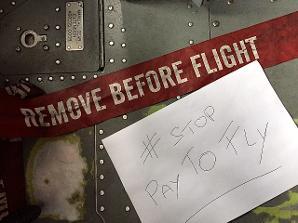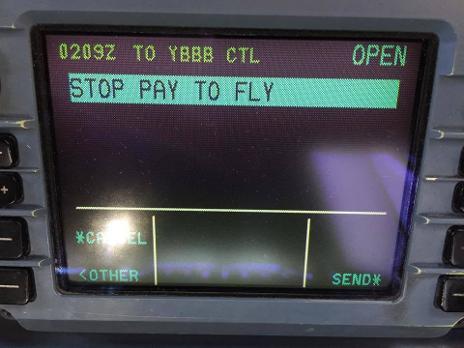

In short: Pay-to-Fly (P2F) is an atypical employment form that occurs when an airline requires the pilot to pay for his/her ‘line-training’ on board of revenue-earning flights, instead of earning a salary.
In full:“Pay-to-fly” (P2F) or “self-sponsored line training” are aviation industry practice whereby a professional pilot flies an aircraft on a regular revenue-earning flight – as any other qualified crewmember – but instead of receiving a salary he/she pays the airline for the flight hours. Usually, these flight hours are part of the ‘type rating’ – a standard in-house training course on a specific type of aircraft – which is part of every pilot’s professional career...
With Europe’s aviation employment market being largely saturated and only few jobs on offer, an increasing number of training schools and airlines sell these flight hours through P2F contracts. The ‘cost’ of these hours is deducted from the pilot’s (usually very low) salary and in most cases equals or even exceeds the salary. Ironically, this means that this young pilot is the one on board who pays most for his/her seat...
After obtaining a commercial pilot license, and before being specialised for flying on a certain type of aircraft (e.g. B737, A320 etc.), pilots need to obtain a specific qualification, called ‘type-rating’. Type-rating represents a necessary investment any company has to make in order to qualify their pilots on their own aircraft types.
P2F schemes mean that part of this investment is being progressively transferred away from airlines onto individual pilots who are at the very beginning of their flying career. “Pay-to-fly” schemes take advantage in particular of the last step of the type-rating, which is called “line training”. During such line training the pilot operates in the cockpit as a regular pilot together with a line training captain, and does so on a normal revenue-earning passenger flight. For this, newly trained pilots are required to buy a package of flight hours to gain their flight experience ‘on the line’.
P2F contract costs the pilot approx. 40.000 €. But the can vary from 30.000€ - 50.000€, depending on the aircraft type, duration, country, flight school fees and the airline. This usually comes on top of an already significant existing loan that the pilot has taken to finance his/her initial training at the Flight Training School (often between 70.000€ - 130.000€). However, despite this additional personal ‘investment’, the chances of permanent employment after the P2F contract at the same airline are usually very limited to non-existent. Current examples show that some airlines have specialised in consecutively ‘employing’ young pilots as a new category of ‘revolving door P2F pilots’ – without any intention of offering them a position afterwards.


In some European countries, e.g. France this practice is not legal. But even if not illegal, this practice is highly unacceptable.
An employee shall never pay for the required training, as the pilot is already productive when operating on these regular passenger flights. It is not acceptable that a pilot has to pay for the flying hours – thereby replacing a fully qualified revenue-earning pilot in the cockpit.
Recent research into ‘Atypical forms of employment in aviation’, carried out by the Ghent University (Belgium), the researchers identify P2F schemes as one of the most extreme and exploitative forms of pilot employment. In their report, presented in Feb. 2015, they recommend that P2F schemes are banned. This comes in addition to a new trend, identified by the Ghent University, towards (bogus) self-employment of pilots, temporary agency work and zero-hours contracts where pilots are paid by the hour flown.
The European Cockpit Association strongly denounces this as unacceptable and calls for a European-wide ban on this practice. ECA also supports the petition launched by a group of young pilots for banning P2F and calls upon passengers, European aviation workers and the general public to sign and disseminate it.